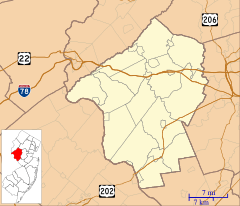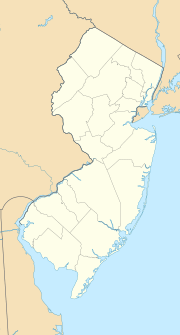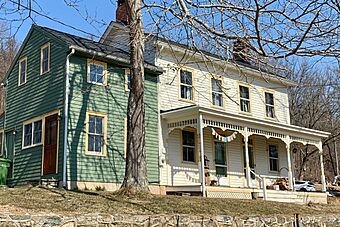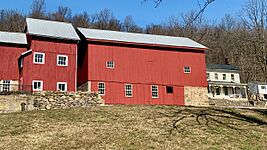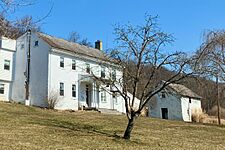Amsterdam, New Jersey facts for kids
Quick facts for kids
Amsterdam, New Jersey
|
|
|---|---|
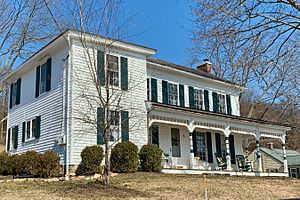
Historic house at 5 Amsterdam Road
|
|
| Country | |
| State | |
| County | Hunterdon |
| Township | Holland |
| Elevation | 335 ft (102 m) |
| GNIS feature ID | 874335 |
Amsterdam is a small community in Holland Township, New Jersey. It is located in Hunterdon County. The community is found near the Musconetcong Mountain. People first settled here in the early 1700s. Amsterdam was later named after the famous city of Amsterdam in the Netherlands.
The entire community is part of the Amsterdam Historic District. This district was added to important lists in 1995. This means its old buildings and history are protected.
History of Amsterdam
By 1881, Amsterdam had useful shops. There was a saw mill for cutting wood. A carpenter shop helped build things. There was also a shoe shop for making or fixing shoes. These businesses were important for the community.
A railroad called the Belvidere Delaware Railroad was built in the 1850s. It ran along the Delaware River. However, this railroad did not go through Amsterdam itself.
Amsterdam Historic District
The Amsterdam Historic District is a special area. It covers 60 acres of land. This district includes the community along Amsterdam, Church, and Crab Apple Hill roads. It was added to the National Register of Historic Places in 1995. This was because of its important architecture and how the community grew. The district has 30 buildings that help tell its story.
Historic Homes in the District
The farmhouse at 5 Amsterdam Road was built around 1830 to 1850. It shows influences of Greek Revival style. This style often uses elements from ancient Greek temples.
Another farmhouse, at 21 Amsterdam Road, was built around 1840 to 1850. It has decorations from the Queen Anne style. This style is known for its fancy details.
Both of these farms have special barns called bank barns. These barns are also important parts of the historic district.
The farmhouse at 33 Amsterdam Road was built around 1830 to 1850. It shows influences of Gothic Revival architecture. This style often includes pointed arches and steep roofs.
 | Janet Taylor Pickett |
 | Synthia Saint James |
 | Howardena Pindell |
 | Faith Ringgold |


